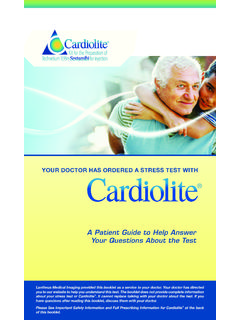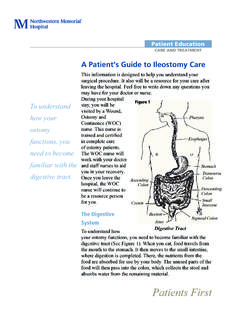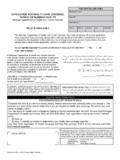Transcription of Making REHABILITATION Decisions - Stroke …
1 Making REHABILITATION Decisions 2017 American Heart Association TABLE OF. CONTENTS: 02 INTRODUCTION. 03 I. MEDICAL REHABILITATION . A. What will I do in REHABILITATION ? B. When does REHABILITATION begin? C. What is a REHABILITATION program? 04 II. CHOOSING THE RIGHT SETTING. A. Inpatient REHABILITATION Facility B. Skilled Nursing Facility C. Long-Term Care Facility D. Long-Term Acute Care Hospital E. Home-Based or Outpatient Care 06 III. QUESTIONS TO ASK your . HEALTHCARE PROVIDER. A. Questions Before Discharge B. Questions About Post-Acute Setting(s). 07 IV.
2 PRACTICAL TOOLS AND. EMOTIONAL SUPPORT. A. American Stroke Association Resources B. External Resources ONE DAY WE WILL BE ABLE TO TALK. ABOUT A Stroke AND WHAT IT USED. TO BE AND HOW WE HAD A HAND. IN STOPPING THEM. BRADY JOHNSON. INTRODUCTION. YOU ARE NOT ALONE. THERE ARE MORE THAN We understand that Stroke can change the rest of your life in an instant. High-quality rehab will SEVEN MILLION Stroke SURVIVORS IN THE UNITED help ensure that you reach your full-potential WHILE THEIR STROKES VARIED IN TYPE. recovery. We offer this guide to help you get started.
3 It includes the information you and your AND SEVERITY, MANY OF THESE PATIENTS AND family need to make informed Decisions and plan the REHABILITATION journey. THEIR FAMILY MEMBERS HAVE BEEN WHERE YOU. ARE NOW-- FACING IMPORTANT Decisions ABOUT The best Stroke rehab results from a combined effort by you and your loved ones along with REHABILITATION THAT MUST BE MADE QUICKLY. a team of healthcare professionals. 02. MEDICAL REHABILITATION . REHABILITATION IS KEY TO RECOVERY AFTER Stroke . IT HELPS YOU RELEARN OR CHANGE HOW YOU LIVE. WHAT WILL I DO IN REHAB? Stroke REHAB SHOULD INCLUDE: What you do in rehab depends on what you need to be Training to improve mobility and ability to do independent.
4 Areas you may need to improve include: daily tasks Self-care skills such as feeding, grooming, bathing, Tailored post- Stroke exercise program toileting and dressing Access to cognitive/engagement activities Mobility skills such as transferring (from (books, games, computer). chair to bed or bed to chair, etc), walking Speech therapy, if Stroke caused difficulty or self-propelling a wheelchair speaking or swallowing Communication skills in speech and language Eye exercises, if Stroke caused a loss of vision Cognitive skills such as memory or problem solving Balance training for those with poor balance Social skills for interacting with other people or with a fall risk Adaptive strategies to help you function within WHEN DOES REHAB BEGIN?
5 A new normal . your doctor decides when you're stable and able to benefit from it. Most rehab services require a doctor's order. WHAT IS A REHAB PROGRAM? YOU OR your LOVED ONE. A program may include: MAY ALSO NEED A VOCATIONAL. REHABILITATION Nursing THIS INCLUDES. Physical Therapy A LOOK AT your MEDICAL, Occupational Therapy PSYCHOLOGICAL, SOCIAL, Speech-Language Therapy VOCATIONAL, EDUCATIONAL. Hearing Therapy AND CULTURAL STATUS. Recreational Therapy Nutritional Care A PLAN IS THEN MADE TO. Counseling HELP YOU WORK EVEN IF YOU. Social Work HAVE A DISABILITY.
6 Psychiatry/Psychology DRIVER'S TRAINING MAY ALSO. Chaplaincy BE PART OF THE PLAN. Patient/Family Education Support Groups 03. CHOOSING THE RIGHT SETTING. YOU CAN REHAB AT: Inpatient REHABILITATION Facility Skilled Nursing Facility Long-Term Care Facility Long-Term Acute Care Hospital Home-based or Outpatient Care your needs determine which type(s) is best for you. INPATIENT REHABILITATION FACILITY (IRF)1. An IRF can be a separate unit of a hospital or a free-standing building that provides hospital-level care to Stroke survivors who need intensive REHABILITATION .
7 IRFs provide at least three hours a day of active REHABILITATION at least five days a week with: Physical Therapists Occupational Therapists Speech Therapists Nurses (available 24/7). Doctors typically visit daily The AHA/ASA recommends IRF care if you can tolerate at least three hours a day of Stroke REHABILITATION . Medicare generally covers your care in an IRF. You will need to pay your Medicare Part A deductible and coinsurance. Some Medicare supplemental ( Medigap ) insurance policies will cover part or all of your deductible and coinsurance so check your insurance coverage.
8 Private insurance coverage for IRF care varies. SKILLED NURSING FACILITY (SNF). A SNF provides REHABILITATION care and skilled nursing services for patients who: Are not well enough to be discharged to home and cannot tolerate the more intensive amount of therapy provided by an IRF. Can benefit from having a a registered nurse on site for a minimum of eight hours a day (on a physician's plan). Need nursing and/or REHABILITATION . Don't need daily supervision by a physician, although the care provided must still be based on a physician's plans. A SNF can be a standalone facility, but when it is in a nursing home or hospital it must be a separately licensed unit, wing or building.
9 Medicare will generally cover up to 100 days in a SNF. You will pay nothing for the first 20 days. There will be a co-pay for days 21-100. Some Medicare supplemental ( Medigap ) insurance policies will cover part or all of your co-pay so check your insurance coverage. Private insurance coverage for care at a SNF 04. CHOOSING THE RIGHT SETTING, continued LONG-TERM CARE FACILITY. Long-term care facilities (nursing home) provide long-term basic nursing care and assistance for people who need help with everyday activities, such as dressing or bathing. This is residential care for people who can't live in the Long-term care facilities provide limited rehabilitative services except for those receiving care through a separate SNF wing or Long-term care is generally paid out of pocket, by long-term care insurance or through the Medicaid program.
10 Medicare and most private health insurance (comprehensive medical) policies do NOT cover long term care facilitiy LONG-TERM ACUTE CARE HOSPITAL. Provide extended care to those with complex medical needs (such as those on a ventilator) due to a combination of acute and chronic The average length of stay is 25+ Medicare, Medicaid and most private health insurance plans cover this care, although you may have copays or HOME-BASED OR OUTPATIENT CARE. Provided by home healthcare agencies or in outpatient office. Medicare, Medicaid and some private insurance plans cover home health care and outpatient therapy services.








